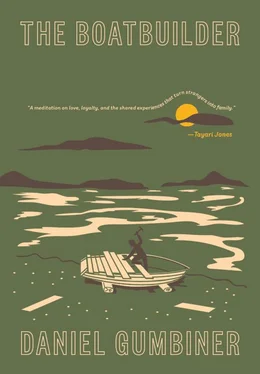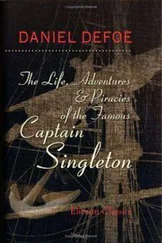Uffa didn’t respond.
“Like, didn’t he kill someone?” Garrett said. “In Mexico? I know he went postal on Teddy Kearns at the Western that one time.”
Uffa stubbed out his spliff on the bottom of his boot. “Well, how ’bout we haul this boat inside?” he said.
The three men lifted the old canoe off the back of the truck and carried it into the barn. After they set it down on two saw-horses, Berg looked around. It was like being in some kind of cathedral. Tall ceilings and tall windows and boats hanging from the rafters, strung up by thick cords of rope, listing gently in the air. Everything shot through with columns of cold morning light, smelling of straw and saltwater and fresh sawdust. In the center of the shop there was a thirty-foot boat on blocks and, in the back, there was a loft. An older man was on his knees on the floor of the loft, staring at the ground, a pencil in his mouth. He was wearing jeans and sandals and a black turtleneck with holes in it. He did not look up from his work when they entered.
“Well, what do you think?” Garrett asked Uffa.
“There are no bleeding fasteners,” Uffa said, circling the canoe. “And this crack that you were worried about is horizontal, not vertical. So we should be able to just put some bedding compound in there and it will be fine. We’ll redo this rub strake for you, too.”
“Great,” Garrett said. “Thanks, Uffa. Hey, what happened to John? He’s not working in the shop anymore?”
“Cut his hand on the table saw.”
“Oh shit. You know, I thought his finger looked weird last time I saw him at the Western, but I wasn’t sure if it had always been like that.”
“Yeah, he lost a bit of his finger,” Uffa said.
“I figured it might be something like that, but you never know. I met a girl in Willits who was born without a big toe. Some kind of deformity. Ran in the family. Several of them without big toes. Well, anyway.” He looked around the shop, distracted. “We should get back to work. Mangini’s really cracking the whip these days.”
As Berg and Garrett walked back to the truck, a couple of dogs barked at them and then ran off toward some trees, distracted by a squirrel. In the distance, Berg saw a young girl running along the path down to the farmhouse, barefoot and tan, a fistful of blue flowers in her hand.
“I need to go back inside,” Berg said.
“Why?” Garrett said.
“I’ll just be a second.”
“Okay,” Garrett said, taking out his phone and beginning to flip through women on a dating app. “Hurry up.”
Back in the barn, Berg found Uffa leaning over the canoe, picking at a piece of caulking near the stern.
“Oh hey,” Uffa said.
“Hi. I was wondering if you guys need any help now, because Tom’s hand was hurt and all.”
“John?”
“Right, John’s hand, and I was thinking that maybe… I mean I don’t know how to do anything, really… but…”
“You’d have to talk to ask Alejandro about this,” Uffa said.
He led Berg across the shop and up the stairs to the loft.
“Ale,” Uffa said. “This is Berg. He’s interested in becoming an apprentice.”
Now that Berg was up on the floor of the loft, he could see what Alejandro was working on. It was a big sketch of a boat, precise and elegant. The sketch was drawn on multiple pieces of plywood, which had been painted white, and it ran the entire length of the barn. The old man looked up from the drawing and took off his glasses. His eyes were a muddy blue, the color of pond water.
“You would like to be an apprentice?” he asked.
“Yes,” Berg said. “I mean, I think so. I don’t really know what that means.”
“It means you work here four days a week for free for the next month and then, if you like the work and we like each other, I begin to pay a stipend for the next two years. And you can live in that cubby back there, if you like.”
Berg turned around and saw that there was a triangular door at the far end of the loft floor.
“That would be great,” he said.
“Very good then,” Alejandro said. He stood up, hobbled over to Berg, and shook his hand. He smelled like coffee and sweet tobacco. “I hope you find the work rewarding,” he said. “It’s not for everyone, and that’s okay. If you don’t like it, you don’t like it. It’s no problem.”
“Okay,” Berg said, desperately hoping he would like it.
“You’ll start next week.”
Berg walked outside and got into Garrett’s truck. As they drove back to Fernwood, he watched the bay on his right. Small coves and reedy beaches, a light fog approaching, wolf-colored and wet. He did some quick calculus to determine whether or not he would be able to afford the apprenticeship. If he kept working at Fernwood a few days a week, he could probably get by. Then he thought about how he’d broken into what he now assumed was Alejandro’s house, months ago. He thought about all the photos of boats and the oilskin map. He thought about the Lortabs and the amulet and how he’d taken a shit in the bathroom. But these memories were too shameful, too sad. He pushed them out of his mind, far out of his mind, to the extent that, weeks later, he was not sure if they were even real.
FOR THE FIRST FEW days of his apprenticeship, Berg didn’t do anything but sharpen. The key to good woodworking, Alejandro said, and boatbuilding in particular, is having sharp tools. And the key to sharpening tools, he explained, is patience and awareness. If you did not maintain balanced strokes against the stone, the edge of the blade would begin to round. On the first day, Alejandro gave Berg a brief lesson in sharpening and then he set him loose.
Berg’s first task was to get the flat end of the chisel entirely level. You did this by rubbing the back of the chisel against the water stones, applying pressure to the front edge of chisel, where it was likely to lift up. From there, you gave the beveled side of the blade an angle, stabilizing the chisel with both hands. After every few strokes, you would dip the blade in a plastic tub of water and hold it up to the light to examine it. It was crucial to keep the blade at the same angle the whole time. If your hands shifted position, you would begin sharpening at a different angle and the blade would become dull.
Berg’s progress was slow. He had always had shaky hands—his friends in high school had made fun of him for it—and he couldn’t figure out how to keep the handle of the chisel stable as he sharpened. All it took was the tiniest twitch and then he had made a bad stroke and he basically had to start all over. His mind would wander, too. He’d be paying attention to the strokes, placing them carefully and accurately, and then he’d begin to think about something else—if Nell was really going to get a dog, as she’d said on the phone the other day; how he owed his brother a call; how he’d left the acetone uncapped in the toolshed at Fernwood—and he would make another bad stroke and have to backpedal.
After the first couple of days he managed to produce a few moderately sharp chisels and Alejandro gave him a plane blade to work on. Uffa had just returned from a trip to Oakland and it was the first day the two of them were working together at the same time. Berg sharpened the blade Alejandro had given him for about an hour and, at one point, he got a pretty good angle going and he began to wonder if he was finished. He looked at the blade in the light, as Alejandro had demonstrated, and tried to determine if it was perfectly flat. He wasn’t sure. He decided to walk over to Alejandro and show him.
Alejandro was working a big piece of lumber with an adze. He set down the adze and held Berg’s blade to the light, chest heaving.
Читать дальше












